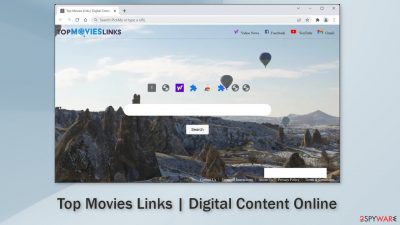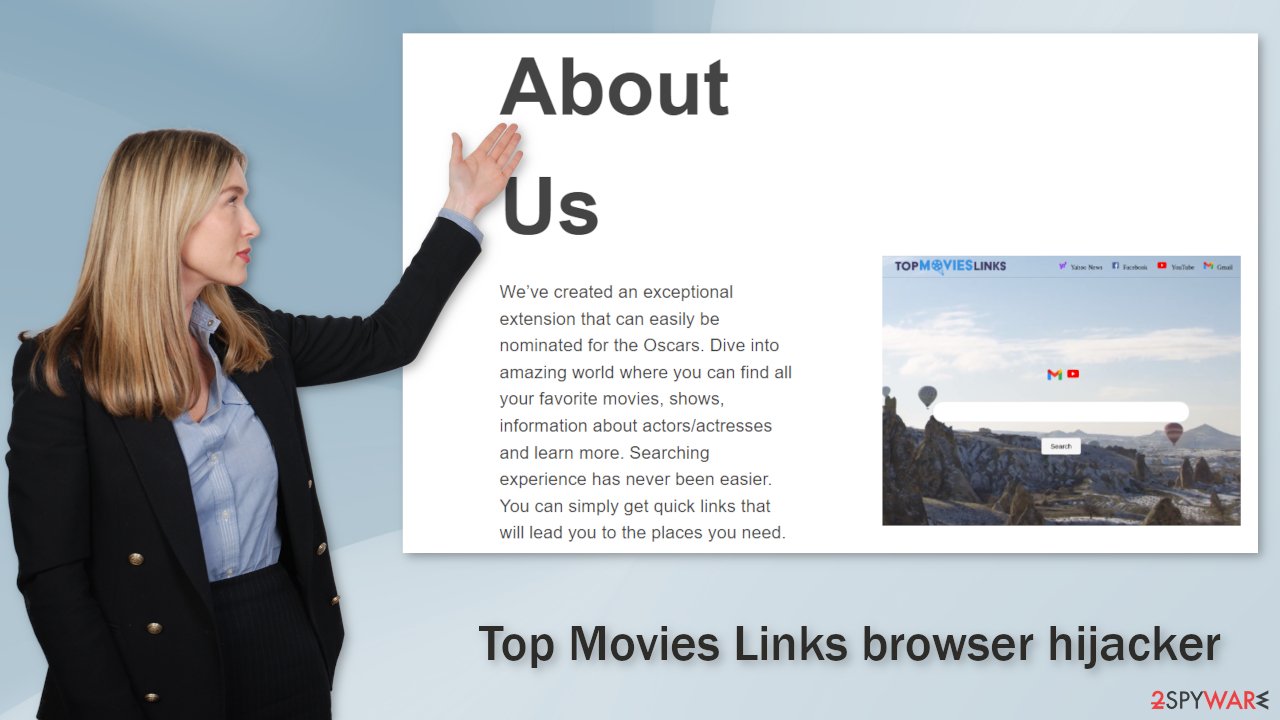Top Movies Links | Digital Content Online hijacker (virus) - Free Guide
Top Movies Links | Digital Content Online hijacker Removal Guide
What is Top Movies Links | Digital Content Online hijacker?
Top Movies Links | Digital Content Online hijacker claims to provide a better search for movie fans

Top Movies Links | Digital Content Online is a browser hijacker that can change the main settings, like the homepage, new tab address, and search engine. It claims to provide an easier search for users that are looking for movies and information about actors. In reality, this browser plugin does not provide any benefits for everyday users.
Instead, it can cause redirects, commercial content, like pop-ups, banners, and lead users to dangerous pages that use social engineering techniques to trick them into providing personal information, downloading PUPs (potentially unwanted programs),[1] and malware.
The plugin also does not live up to its own claims because it does not even offer a custom search engine that would allow a quicker search for movie-related topics. All it does is redirect users' queries to Bing.com, a well-known search engine.
Browser hijackers rarely implement their own search engines because it requires a lot of effort. They include already existing ones just to make the application functional. Sometimes it can be fake search engines that can show inaccurate results and lead to misinformation.
However, these are not all the dangers that browser hijackers present. Web-based applications can also monitor user activity with the help of various tracking technologies, like cookies.[2] Often fraudsters can see your IP address, geolocation, the websites you visit, links you click on, and things you purchase online.
Security experts recommend clearing browser data regularly to avoid it from going into the wrong hands, like rogue advertising networks or other third parties. Luckily, FortectIntego, a powerful repair tool can take care of this automatically, and with a click of a button. You should use it to stop any tracking and delete the collected information.
| NAME | Top Movies Links | Digital Content Online |
| TYPE | Browser hijacker; potentially unwanted program |
| SYMPTOMS | Changed homepage, search engine, new tab address; redirects to suspicious sites; increased amount of commercial content |
| DISTRIBUTION | Questionable sites, deceptive ads, freeware installations |
| DANGERS | Data gathering about users' browsing activity, links embedded in the search results, pop-ups can lead to dangerous websites |
| ELIMINATION | You can remove an unwanted extension via browser settings or by scanning your system with anti-malware tools |
| FURTHER STEPS | Use FortectIntego repair tool to fix any remaining damage left |
Distribution techniques
To avoid being affected by a browser hijacker like Top Movies Links | Digital Content Online, it is important to know how such apps are spread on the Internet. One of the most common causes for browser hijacker infections is shady pages. Users often browse through sites that engage in illegal activities. They are full of deceptive ads and sneaky redirects because they are unregulated.
Crooks target less IT-savvy people and create separate promotional websites for their applications. These websites often boast about all the non-existent functions and try to convince users that they need the app. But it is important to do your own research and not trust everything you see online. Try to find as much information as you can about the promoted extension.
If you type the name of a browser hijacker into the search, most often you will find that not many results show up. If you cannot find any reviews, ratings, or how many users the app has, it is better to skip it and choose the one you can find plenty of feedback about.
However, the plugin could have also been added to your browser by a PUA hiding in the background. If adware or other types of PUPs get into your system, it can attach hijackers that generate revenue with pay-per-click advertising.[3] So in the event of such an infection, it is important to check your system thoroughly.

Remove the Top Movies Links browser plugin
You can remove browser extensions by going to your browser settings:
Google Chrome
- Open Google Chrome, click on the Menu (three vertical dots at the top-right corner) and select More tools > Extensions.
- In the newly opened window, you will see all the installed extensions. Uninstall all the suspicious plugins that might be related to the unwanted program by clicking Remove.
![Remove extensions from Chrome Remove extensions from Chrome]()
MS Edge:
- Select Menu (three horizontal dots at the top-right of the browser window) and pick Extensions.
- From the list, pick the extension and click on the Gear icon.
- Click on Uninstall at the bottom.
![Remove extensions from Edge Remove extensions from Edge]()
MS Edge (Chromium)
- Open Edge and click select Settings > Extensions.
- Delete unwanted extensions by clicking Remove.
![Remove extensions from Chromium Edge Remove extensions from Chromium Edge]()
Mozilla Firefox
- Open Mozilla Firefox browser and click on the Menu (three horizontal lines at the top-right of the window).
- Select Add-ons.
- In here, select unwanted plugin and click Remove.
![Remove extensions from Firefox Remove extensions from Firefox]()
Safari
- Click Safari > Preferences…
- In the new window, pick Extensions.
- Select the unwanted extension and select Uninstall.
![Remove extensions from Safari Remove extensions from Safari]()
Check your system for adware
Eliminating only the extension may not be enough because you might have adware installed in your system. If you still experience the settings changing, pop-ups and banners, the best option is to use professional security tools like SpyHunter 5Combo Cleaner or Malwarebytes to make sure you get rid of not only the PUA itself but also all the related files and entries.
What is more, the program may not be named the same as the extension, so it can be complicated to identify it. Sometimes developers disguise such apps as handy tools, so you would not suspect them. Anti-malware tools can detect suspicious processes in your machine and eliminate them entirely better than you can.
However, if you are sure you know which program is causing the symptoms and manual removal is what you still prefer, we have instructions for Windows and Mac machines:
Windows 10/8:
- Enter Control Panel into Windows search box and hit Enter or click on the search result.
- Under Programs, select Uninstall a program.
![Uninstall from Windows 1 Uninstall from Windows 1]()
- From the list, find the entry of the suspicious program.
- Right-click on the application and select Uninstall.
- If User Account Control shows up, click Yes.
- Wait till uninstallation process is complete and click OK.
![Uninstall from Windows 2 Uninstall from Windows 2]()
Windows 7/XP:
- Click on Windows Start > Control Panel located on the right pane (if you are Windows XP user, click on Add/Remove Programs).
- In Control Panel, select Programs > Uninstall a program.
![Uninstall from Windows 7/XP Uninstall from Windows 7/XP]()
- Pick the unwanted application by clicking on it once.
- At the top, click Uninstall/Change.
- In the confirmation prompt, pick Yes.
- Click OK once the removal process is finished.
Mac:
- From the menu bar, select Go > Applications.
- In the Applications folder, look for all related entries.
- Click on the app and drag it to Trash (or right-click and pick Move to Trash)
![Uninstall from Mac 1 Uninstall from Mac 1]()
To fully remove an unwanted app, you need to access Application Support, LaunchAgents, and LaunchDaemons folders and delete relevant files:
- Select Go > Go to Folder.
- Enter /Library/Application Support and click Go or press Enter.
- In the Application Support folder, look for any dubious entries and then delete them.
- Now enter /Library/LaunchAgents and /Library/LaunchDaemons folders the same way and terminate all the related .plist files.
![Uninstall from Mac 2 Uninstall from Mac 2]()
You should be aware that adware and other PUPs can be spread on freeware[4] distribution sites. Individuals that run these platforms need to make money, so they include additional programs in the installers hoping that users will not notice them. Unfortunately, that is exactly what happens most of the time, as people do not really pay attention to the installation process. This practice is called software bundling.
We recommend using only official stores and websites to get your software from, but we know it can get costly. You should at least implement some habits into your routine:
- Always choose “Custom” or “Advanced” installation methods.
- Read the Privacy Policy and Terms of Use. Although it may take some time, in these sections you can learn about what the program will be capable to do in your machine and what data it will collect.
- The most important part is to inspect the file list. If you see any additional files that are unnecessary, untick the boxes next to their names.
How to prevent from getting browser hijacker
Stream videos without limitations, no matter where you are
There are multiple parties that could find out almost anything about you by checking your online activity. While this is highly unlikely, advertisers and tech companies are constantly tracking you online. The first step to privacy should be a secure browser that focuses on tracker reduction to a minimum.
Even if you employ a secure browser, you will not be able to access websites that are restricted due to local government laws or other reasons. In other words, you may not be able to stream Disney+ or US-based Netflix in some countries. To bypass these restrictions, you can employ a powerful Private Internet Access VPN, which provides dedicated servers for torrenting and streaming, not slowing you down in the process.
Data backups are important – recover your lost files
Ransomware is one of the biggest threats to personal data. Once it is executed on a machine, it launches a sophisticated encryption algorithm that locks all your files, although it does not destroy them. The most common misconception is that anti-malware software can return files to their previous states. This is not true, however, and data remains locked after the malicious payload is deleted.
While regular data backups are the only secure method to recover your files after a ransomware attack, tools such as Data Recovery Pro can also be effective and restore at least some of your lost data.
- ^ Chris Hoffman. PUPs Explained: What is a “Potentially Unwanted Program”?. HowToGeek. Technology Magazine.
- ^ What Is PPC? Learn the Basics of Pay-Per-Click (PPC) Marketing. Wordstream. Advertising Solutions.
- ^ What are Cookies?. Kaspersky. Home Security.
- ^ Tim Fisher. What Is Freeware?. Lifewire. Internet, Networking and Security.










